La recuperación de los centros historicos y su desarrollo integral
Organigrama
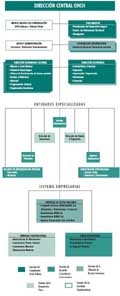
También fueron definidas, en el Plan de Desarrollo Integral, diez estrategias esenciales para la actuación en el territorio, que responden a las políticas ya enunciadas. La territorialización de estas políticas y estrategias, se da a partir de la implementación del Plan de Inversiones y de los Programas socio-culturales, conducidos por la Oficina del Historiador.
•RECUPERAR LA ESTRUCTURA URBANA PATRIMONIAL, que plantea como principales lineamientos la concentración del peso de la rehabilitación en áreas de fuerte potencialidad, ampliando su radio de acción en la medida de la disponibilidad de recursos; recuperar ejes terciarios y bordes del conjunto urbano con marcada prioridad; desarrollar focos aislados, dinamizadores del proceso, en áreas internas del conjunto urbano y mantener la asignación de recursos a obras puntuales dispersas debido a su hondo contenido social o a su condición de impostergables.
•POTENCIAR EL DESARROLLO CULTURAL a partir del estudio y preservación del patrimonio histórico, arqueológico y artístico y de su desarrollo y divulgación; contribuir al conocimiento y disfrute de ese patrimonio por parte de la comunidad del Centro Histórico y la población en general, mediante una programación cultural; divulgar la labor de la Oficina del Historiador en el rescate y preservación del patrimonio; continuar la comercialización de los más auténticos productos culturales, contribuyendo a la vez a la sostenibilidad de la tarea de restauración y conservación de los bienes museables.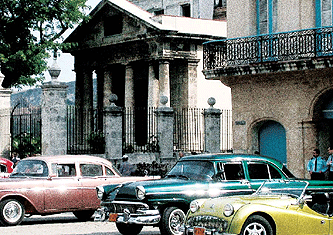
•DESARROLLAR LA ECONOMÍA LOCAL a partir de la explotación eficiente de los recursos patrimoniales; modificación paulatina de la estructura económica; fortalecimiento de las actividades económicas que contribuyen al desarrollo del territorio; desarrollo de nuevas actividades y sectores; posibilitar la heterogeneidad de la economía local y diversificar las fuentes de financiamiento.
•POTENCIAR LA FUNCIÓN TERCIARIA que abarca los temas del turismo, las inmobiliarias y servicios metropolitanos garantizando un desarrollo turístico con criterios rigurosos de selectividad y sustentabilidad; evaluar oportunamente las implicaciones funcionales, físicas y económicas derivadas de la asimilación e incremento del turismo de cruceros; priorizar los planes de desarrollo del sector inmobiliario y estimular la recuperación de los diferentes servicios que destacaron al Centro Histórico otorgándole su histórico carácter polifuncional, jerarquizado y cualificado.
•RESOLVER LOS PROBLEMAS DE LA VIVIENDA a partir de la conducción de los programas de mejoramiento de las áreas residenciales desde un planeamiento gestionable; definir un modelo de intervención para el hábitat; concebir los programas del hábitat con proyección social y participativa; establecer una organización productiva descentralizada propia, y que responda íntegramente a los programas del hábitat en el territorio. Diversificar las fuentes de financiamiento para acometer los programas, establecer una máxima racionalización y control de los recursos técnico-materiales y perfeccionar los mecanismos legales que viabilicen los procesos de rehabilitación de la vivienda.
•IMPULSAR UNA REHABILITACIÓN PARTICIPATIVA que promueva la acción de la población residente en el planeamiento; induzca también la participación de representantes informales de la comunidad; favorezca la cogestión de los procesos y conforme un banco de ideas o posibles proyectos.
•DESARROLLAR LOS SERVICIOS AL HÁBITAT (equipamiento comunitario) que deberán alcanzar la excelencia en las condiciones de los centros de enseñanza y una distribución adecuada de los mismos; ejecutar acciones que permitan mejorar los servicios de salud, cuidando una distribución adecuada en el territorio, y fomentar la cultura de la salud por vías alternativas. Asimismo, se plantea rescatar la red comercial y de servicios generales del territorio, tanto en número de locales como en el servicio que se presta en los mismos; consolidar la estructura organizativa dedicada a la higienización del Centro Histórico y completar el equipamiento necesario para la realización de esta tarea; estimular la participación de la población en actividades culturales y acondicionar debidamente las áreas deportivas disponibles, todo en estrecha coordinación con el Gobierno Municipal.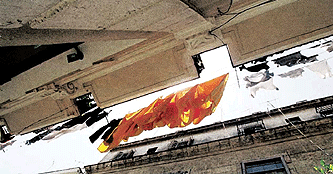
•MEJORAR LAS REDES INFRAESTRUCTURALES analizadas a partir de diferentes lineamientos: los referidos a la vialidad principal plantean responder a las exigencias del tránsito vehicular de acuerdo con las categorías funcionales dentro del sistema vial de la ciudad, estableciendo de forma adicional medidas y restricciones en aquellas vías arteriales y colectoras fomentando la peatonalización; continuar perfeccionando el sistema de vías secundarias y brindar especial atención al mejoramiento del estado técnico de los pavimentos, y a los medios para la regulación y control del tránsito; incrementar la oferta de estacionamiento en diferentes modalidades, para lograr satisfacer esa demanda; complementar la oferta que brinda el sistema de transporte colectivo de la ciudad; organizar la forma de operación del transporte de cargas, a fin de minimizar los efectos negativos que ello genera. En las redes hidrotécnicas, los principales lineamientos se basan en lograr que el suministro de agua potable llegue por la red a todos los consumidores, eliminando el servicio por carros cisternas que actualmente existe; alcanzar mayor calidad en el funcionamiento de los sistemas existentes en el alcantarillado y drenaje pluvial; para el gas manufacturado, lograr el completamiento del plan de gasificación dentro del territorio; en el servicio eléctrico, hacer más eficiente el servicio de la red eléctrica y desarrollar el plan de luz. Para el sistema de corrientes débiles, respecto a la telefonía es importante perfeccionar el servicio telefónico; así como desarrollar la televisión por cable.
•FOMENTAR LA COOPERACIÓN INTERNACIONAL a manera de garantizar una aplicación más eficiente de los recursos de la cooperación; impulsar la cooperación multilateral; impulsar la cooperación descentralizada a través del Programa de Desarrollo Humano Local, auspiciado por PNUD-UNOPS; todo ello en estrecho vínculo con el Ministerio para la Inversión Extranjera y la Colaboración Económica (MINVEC).
•PROMOVER UNA CULTURA DE PROTECCIÓN MEDIOAMBIENTAL que propone elaborar una estrategia de integración metropolitana; conservar el medioambiente urbano, los recursos naturales y la diversidad biológica como parte de la política trazada por el Ministerio de Ciencia, Tecnología y Medio Ambiente; promover la gestión de un sistema de transporte y vialidad más eficiente y acogedor; facilitar una gestión eficiente y eficaz en la recolección de los desechos sólidos y el saneamiento; fomentar el uso eficiente de la energía y cumplir los lineamientos trazados en ese sentido por los Ministerios de la Industria Básica y de Ciencia, Tecnología y Medio Ambiente; cualificar los espacios libres existentes y crear otros nuevos en la Zona y mejorar la salud ambiental y la atención a grupos vulnerables.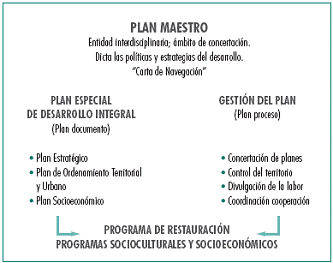
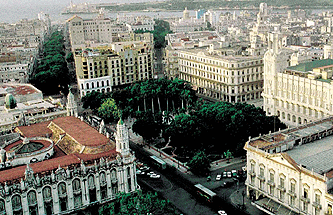
DESCARGA EL BROCHURE PDF
albanés (0.8 MB)inglés (0.9 MB)
español (0.9 MB)
SÓLO TEXTO
•Para adoptar la metodología de la Oficina en otros países








 COUNTRY OF ORIGIN
COUNTRY OF ORIGIN